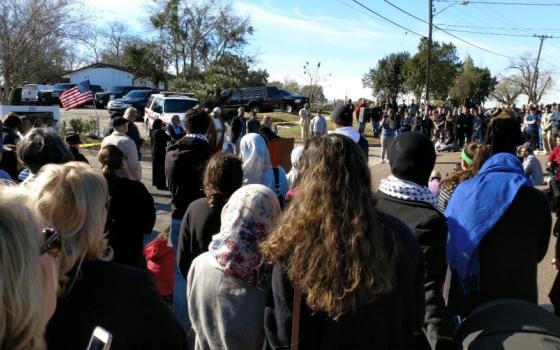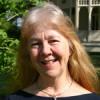Editor's note: This column was updated February 9 at 9:17 a.m. following the investigators' report of the cause of the fire.
In the early hours of the morning on Saturday, January 28, 2017, a fire destroyed the Islamic Center Mosque, a place of prayer for about 140 people in Victoria, Texas. Investigators reported Wednesday that the fire was arson. A diversity of people had been expressing concern and many gathered for prayer the next morning. Sr. Elizabeth Riebschlaeger, a member of the Congregation of the Sisters of Charity of the Incarnate Word, participated in that "Service of Unity and Peace" at the site.
She observed, "Hundreds of people — Christians, Jews, Universalists, atheists and agnostics — came together to stand together in prayer, on the basis of our common humanitarian values and the U.S. Constitution. We began with the Pledge of Allegiance together: as 'one nation, under God, indivisible, with liberty and justice for all.' Never before have these words had such depth of meaning."
During the service Sister Elizabeth filmed M.J. Khan, the president of the Islamic Society of Greater Houston, who spoke of the good that had happened in only one day since the fire. He said that while we have thought of this as a mosque for the Muslims, now we can see that it belongs to all the people of Victoria. He added, "All the places of worship belong to all of us." People of faith and people of no faith are welcome to "come here, find solace in your heart so that your heart is more peaceful." As if to underscore his words, the rabbi of the Jewish congregation in Victoria invited the Muslim community to pray in their synagogue.
Dr. Shahid Hashmi, the Islamic Center's president, asked that the event not be politicized, but that the community focus on the idea that "God is love, and those who live in love, live in God." Peter Bella, a friend of Sister Elizabeth, wrote that over 13,000 people have already given small and large donations to help rebuild the mosque. He said, "This is the America I call home, in which we come to the aid of our brothers and sisters in time of need."
My congregation, the Sisters of Charity of the Incarnate Word, has been blessed to have fine professionals of many faiths including Islam, working in our hospitals. As a university teacher on a research sabbatical at Tantur Ecumenical Institute in Jerusalem over twenty years ago, I was inspired by the goodness of Muslims, Jews, and various groups of Christians around me. This led to travel for research and more interfaith dialogue. Turkish Muslims in the Hizmet (Service) movement work very hard to promote understanding and dialogue. We have become partners working together frequently.
Muslim families in Victoria especially like the Catholic schools because in these their children are learning the ethical principles common in the Abrahamic religions, Judaism, Christianity, and Islam. Prompted by Sister Elizabeth's connections in the Victoria area, a few years ago I was invited to lead a Muslim-Catholic Dialogue for the Victoria Diocese Religious Education Conference. I was assisted by people of this mosque in the dialogue. We used the film "In the Footprints of Francis and the Sultan: a Model for Peacemaking." The study guide for that film (created by Franciscan Sr. Kathleen Warren) has helpful educational materials to build understanding and overcome prejudice.
Sr. Alice Holden, a member of the Congregation of the Sisters of Charity of the Incarnate Word, had considered entering our community's retirement facility on her 80th birthday, but instead felt a call to develop the area where she has lived, on the property of the University of the Incarnate Word, as a center for interfaith activities called "Interfaith, INC." For eight years she had had a ministry of spirituality programs in the lovely wooded area, but she felt a deeper call that her spirituality ministry should be centered in drawing together people of many faiths. Our university has students and faculty of many faiths from over sixty countries, so her call could support the diversity of the university. Sister Alice reveals that as we go deeper in own religious tradition, we are closer to the Holy One and transformed by love. A poet herself, she often quotes the Muslim poet Rumi who writes of the love of God uniting us beyond our divided religious paths.
In his message for the 50th World Day of Peace, "Nonviolence: a Style of Politics for Peace," Pope Francis said that violence will not quell violence. He suggested we follow the example of Muslim Khan Abdul Ghaffar Khan, perhaps because we need to appreciate the good work of Muslims more. Francis also noted that "Women in particular are often leaders of nonviolence, as for example, was Leymah Gbowee and the thousands of Liberian women." Gbowee gathered Muslim and Christian women to organize "nonviolent protest that resulted in high-level peace talks to end the second civil war in Liberia." The pope's example of Leymah Gbowee invites us to set up conversations between Muslim and Christian women on how we can nurture nonviolence and peace. We will have one of those soon here at the University of the Incarnate Word, where we have many Muslim students, including about 200 from Saudi Arabia. There is so much anxiety among students and faculty here.
I first got to know of the Muslim community in Victoria when our mother was critically ill in Citizens Medical Center where my brother works. It is a fine hospital, with a room for prayer. As I went there to pray, I often saw a Muslim physician praying there also, since observant Muslims pray at regular times five times a day. Prayer brings healing. Praying together can help bring healing. We hope that we do not need fires to bring us together for prayer, but if they do, the Compassionate Holy One will cry with us and help us.
I have been influenced by Jesuit spirituality and the idea of "finding God in all things." The Quran says that everywhere we look we can see the face of God. I have grown through Muslim friends who have shared their spirituality and we have found common ground trying to be people of more compassion, justice, and service. In the challenges that we face now, may each of us compassionately try to listen to others, build bridges between communities, and open our eyes to recognize the face of God. So much compassion and unity is growing from the ashes of the mosque.
[Martha Ann Kirk is a member of the Incarnate Word Sisters International Justice, Peace, and Integrity of Creation Committee and currently writing about the sacred dancer Carla De Sola at the Graduate Theological Union, Berkeley, California. Kirk recently authored Iraqi Women of Three Generations: Challenges, Education, and Hopes for Peace, based on her exhibit of photos and interviews.]



